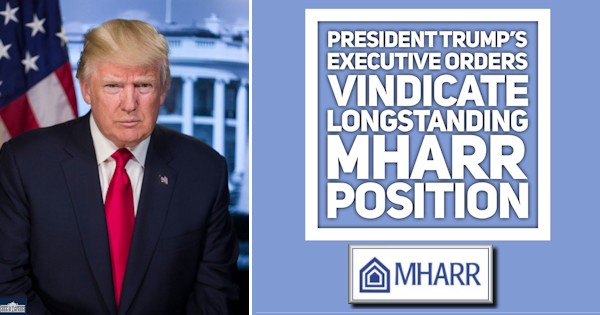
Washington, D.C., October 17, 2019 – President Trump has issued two new Executive Orders (EOs) copies attached designed to stop Executive Branch agency abuse of “guidance memoranda” and other similar unpublished documents that have not gone through notice and comment rulemaking or related due process procedures required by the federal Administrative Procedure Act (APA) and/or other applicable law. As such, the EOs clarify and expand previous 2017 and 2018 U.S. Justice Department pronouncements on this topic and strongly support and vindicate the Manufactured Housing Association for Regulatory Reform’s (MHARR) longstanding position that unpublished “guidance” documents issued by HUD concerning regulatory, enforcement and monitoring matters within the federal manufactured housing program including, but not limited to, “guidance” concerning the scope and focus of in-plant regulation, are invalid, unenforceable, and should be withdrawn.
The Orders, issued on October 9, 2019 and titled: (1) “Executive Order on Promoting the Rule of Law Through Improved Agency Guidance Documents;” and (2) “Executive Order on Promoting the Rule of Law Through Transparency and Fairness in Civil Administrative Enforcement and Adjudication,” specifically address the enforceability of existing “guidance” documents issued by federal agencies without publication or opportunity for comment by interested parties. In relevant part, the Orders state:
“Guidance documents may not be used to impose new standards of conduct on persons outside of the executive branch except as expressly authorized by law…. When an agency takes an administrative enforcement action … or otherwise makes a determination that has legal consequence for a person, it must establish a violation of law by applying statutes and regulations. The agency may nottreat noncompliance with a standard of conduct announced solely in a guidance document as itself a violation of applicable statutes or regulations.” (Emphasis added).
Consequently, the Orders provide that “it is the policy of the Executive Branch … to require that agencies treat guidance documents as non-bindingboth in law and in practice [and] take public input into account when appropriate in formulating guidance documents.” (Emphasis added). Agencies, therefore, “may impose legally binding requirements on the public only through regulations… and only after appropriate process….” (Emphasis added). In the case of manufactured housing, “appropriate process” under the 2000 reform law means full MHCC consideration as well as notice and comment rulemaking.
The Executive Orders thus fully vindicate and support MHARR’s longstanding position that unpublished “guidance” documents and “Standard Operating Procedures” issued by former HUD manufactured housing program Administrator William Matchneer in support of an altered program of expanded in-plant enforcement areinvalid and unenforceable. The same rationale applies to other similar so-called “guidance” documents issued by subsequent program Administrator Pamela Danner in recent years which purport to impose new obligations on regulated parties or construe existing standards or regulations in new ways that effectively impose costly new obligations, criteria or defactostandards on manufacturers, retailers and others. Moreover, the Orders strongly vindicate and support MHARR’s call for the complete withdrawalof all such unpublished “guidance” memoranda and related procedures, stating that “even when accompanied by a disclaimer that it is non-binding, a guidance document issued by an agency may carry the implicit threat of enforcement action if the regulated public does not comply.” This is particularly the case in the federal manufactured housing program with its revenue-driven “monitoring” contractor.
In addition, the Orders also demonstrate that section 604(b)(6) of the Manufactured Housing Improvement Act of 2000 which, by its terms, requires prior MHCC review and notice and comment rulemaking for allchanges to HUD manufactured housing policies, practices and procedures relating to the HUD Code standards, enforcement and monitoring, is valid, properand bindingon its face, and that HUD’s 2010 “Interpretive Rule,” seeking to read section 604(b)(6) out of the 2000 reform law (which MHARR immediately and consistently opposed without support from other segments of the industry), is an illegitimate abuse of agency authority in and of itself which must be withdrawn as proposed by MHARR in its EO 13771/13777 regulatory reform comments. Those proposals – and others – will now be considered by the Manufactured Housing Consensus Committee (MHCC) at its upcoming October 29-31, 2019 meeting, and will hopefully be supported by others in the industry in order to bring an end to such abusive dictates and HUD’s ongoing evasion of 2000 reform law requirements.
In Washington, D.C., MHARR President and CEO Mark Weiss stated: “MHARR is grateful to President Trump for these Executive Orders. In 2010, when MHARR initially protested HUD’s program of expanded in-plant regulation on the basis that it imposed new, different and more costly pseudo-regulatory obligations on manufacturers without MHCC review and notice and comment rulemaking in violation of applicable law and was therefore unenforceable, the then-program administrator wrote, in a flippant March 3, 2010 memorandum, that ‘certain manufacturers [had] received some remarkably bad advice’ that the Department’s new approach to ‘quality assurance’ was ‘voluntary.’” Weiss continued, “As it turns out, however, that is exactlywhat the October 9, 2019 Executive Orders (and earlier 2017 and 2018 U.S. Justice Department opinions) provide. As a result, both the 2010 Interpretive Rule and all HUD program guidance issued without prior MHCC review and publication for notice and comment is non-binding, was unlawfully imposed, and mustbe withdrawn, and the MHCC should demand that HUD do exactly that. MHARR, as before, will take the lead in moving this process forward and calls on all program stakeholders to support this action, which will significantly reduce the regulatory compliance cost component of the retail price of manufactured housing.”
The Manufactured Housing Association for Regulatory Reform is a Washington, D.C.-based national trade association representing the views and interests of independent producers of federally-regulated manufactured housing.


MHARR September 12, 2019 Washington Update — An Exclusive Report and Analysis
National Association of Realtors Research Exposes Manufactured Housing Institute Errors
China-U.S. Moving Toward Deal? Plus, Manufactured Housing Investing, Stock Updates




